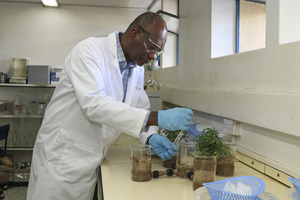Towards the sustainable management of plant parasitic nematodes in smallholder cropping systems : Is wrap and plant the answer ?
 The United Nations estimates that more than half of global population between now and 2050 is expected to occur Africa. However, currently, agricultural production, carried out by millions of small-scale farmers in Africa is not at par with the population growth rate. As such, food security is a major issue on the continent.
The United Nations estimates that more than half of global population between now and 2050 is expected to occur Africa. However, currently, agricultural production, carried out by millions of small-scale farmers in Africa is not at par with the population growth rate. As such, food security is a major issue on the continent.
Small-scale farmers are faced with a myriad of challenges including climate change and variability, nutrient deficient soils, insect pests and diseases and limited resources. Rainfall and temperature can have direct effects on crop yields and indirect effects on insect pests. Minor insect pests and invasive alien species can easily adapt to climate change and become major ones. Farmers indiscriminately apply pesticides to address these environmental challenges.
“To achieve sustainable agriculture and food security in Africa, holistic science-driven solutions combined with education at all levels are urgently needed to address these challenges,” says Dr. Baldwyn Torto, the 2019 laureate of the Agropolis Fondation Louis Malassis International Scientific Prize for Outstanding Career in Agricultural Development.
Dr. Torto’s scientific work, in collaboration with partners from different disciplines, focuses on reducing the devastating effects of insect pests through development of simple, effective and integrated pest management strategies that fit into the farming systems of small scale-farmers in Africa to boost agricultural production in order to ensure food security.
“Specifically, my team contributes knowledge to a multi-disciplinary team of researchers comprising agronomists, modelers, insect pathologists, molecular biologists, social scientists and technology transfer specialists, on how pests and beneficial organisms in agriculture utilize chemistry for their ecology, and application of this knowledge to develop integrated crop protection programmes to ensure food security in Africa,” adds Dr. Torto.
Among the key research questions that Baldwyn and his team are addressing
 include : why do certain insects choose certain crops ; how do they find these crops, what do they feed on, how do the different sexes find each other to reproduce ; why do some stages of the insect form groups, how does the crop defend itself against the attack, and more importantly, what is the role of insect pollinators in the cropping system and landscape to assure bee health.
include : why do certain insects choose certain crops ; how do they find these crops, what do they feed on, how do the different sexes find each other to reproduce ; why do some stages of the insect form groups, how does the crop defend itself against the attack, and more importantly, what is the role of insect pollinators in the cropping system and landscape to assure bee health.
The technologies developed by Dr. Torto with his partners are first taken up by scientists working in different disciplines for integration into other crop protection strategies. They have contributed to enhance agricultural production and livelihoods in hundreds of thousands of resource poor farmers in Africa. Additionally, they reduce the risk of exposure to harmful pesticides and contamination of the environment. To assure the continuation of this effort, these technologies have been introduced into the curriculum of several higher educational institutions in Africa and other parts of the world.
“Our discoveries in honeybee health is contributing to improved better beekeeping management practices involving over 20,000 farmers in various countries in Africa. Our work has also assured the continuation of this scientific discipline by providing direction and insight to a team of students and postdocs,” says Dr. Torto.
These students and postdocs (from Sub-Saharan Africa, in Europe and in the USA) have gone back to their countries of origin, and contribut to effective research programs in pest management and agriculture.
Dr. Baldwyn Torto is currently the head of the Department of Behavior and Chemical Ecology of the Kenya-based the International Centre of Insect Physiology and Ecology (Icipe).
